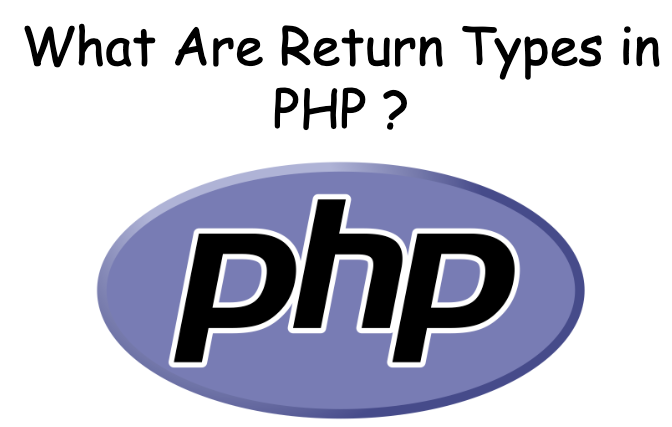I studied Java in my university. It was strictly typed programming language and had to define the
return type for a function.
But, I started my career as PHP developer with PHP programming.
PHP 5.6 did not had a concept of return type or type hinting.
In my early days, I used to get confused.
I worked in many small to big projects. For all projects I used PHP and this language become primary backend programming language for me.
Now, I am also working with other languages. But, I have deep connection with PHP. I am closely monitoring the evolution in PHP space.
PHP 7 followed on the heels of PHP 5.6 and the release was a big revolution.
Chronologically PHP 7 is confusing version but brought enormous improvements in PHP engine performance. It also introduced a variety of new, impactful features that made it quickly adopted.
In this release PHP community added a new impactful feature Type hinting. Type hinting is being referred to as Return Type declaration. Return type declaration specifies the type of value that a function should return. Also, community releasing new Type Hinting in new releases.
In this post, I will try to explain Type hinting added in each release with example.
PHP 7.0.0
PHP 7.0.0 added new features to support int float, bool, string, interfaces, array and callable return types.
I will explain them with examples.
1. int return type
int return type declaration specifies that a function can return integer value.
Example:
2. float return type
float return type declaration specifies that a function can return floating number ie 1.2, 0.5, etc.
Example:
3. bool return type
bool return type declaration specifies that a function should return boolean value fo true or false
Example:
4. string return type
string return type declaration specifies that a function should return boolean value of string. It could be combination of alphabets, numbers and special characters.
Example:
5. interfaces return type
interfaces return type declaration specifies that a function should return interfaces rather than a specific value.
Example:
| |
6. array return type
array return type declaration specifies that a function should return array value.
Example:
7. callable return type
Type declarations can be added to function arguments, return values.
PHP 7.1.0
PHP 7.1.0 added new features to support iterable void, and null return types.
1. iterable return type
iterable is a built-in compile time type alias for array|Traversable.
Example:
2. void return type
void return type is used in a function if function dose not return anything.
Example
3. nullable return type
null can be passed as an argument, or returned as a value, respectively.
Example:
PHP 7.2.0
PHP 7.2.0 added new features to support object return type for a function.
1. object Return type
Object is used to return an instances of any class. In our example, we are declaring Object as return type for returnA() in class B
| |
PHP 8.0.0
PHP 8.0.0 added new features to support Union return type, only static and mixed return type for a function.
1. Union return type
PHP 7.1.0 have nullable types, which means you can declare the type to be null with a type declaration similar to ?string
From PHP 8.0, you can declare more than one type for arguments, return types, and class properties.
Example:
2. return only type static
PHP class methods can return self and parent in older versions, but static was not allowed.
PHP 8.0 allowed static return type.
Example
3. mixed return type
mixed return type is equivalent to a Union Type of:
string|int|float|bool|null|array|object|callable|resource
Example
PHP 8.1.0
PHP 8.1.0 added new features to support never and intersection types.
Also, returning by reference from a void function was deprecated
1. never return type
The function that always throws an exception or terminates with a die/exit call can be declared with the never.
A never return type indicates that it will never return a value,
It’s similar to the void return type, but the never return type guarantees that the program will throw and exception or terminate.
Example
2. intersection types
intersection types let you typehint values that must satisfy more than one type constraint.
From PHP 8.1.0 we already have union types that combine types with a logical “or” clause; intersection types offer an logical “and” clause instead.
We already know that “the type of $value should be A or B”:
As we discussed above intersection types offer an logical “and” clause. The $value type should be A and B:
This type hint is not frequently used like other type hints.
PHP 8.2.0
PHP 8.2.0 added new features to support literal type true, DNF types and null and false can be used standalone.
Example
1. The types null and false can be used standalone.
PHP 8.2.0 started to support null and false as standalone types.
In previous, versions, we can not use these types like standalone type.
Example
But can not do like this. This will throw error
| |
2. literal type true
PHP 8.2.0 started to support true types, DNF types and
true type can be used as part of Union Types, But you can not use it with bool it creates ambiguity
3. DNF types
PHP 8.2.0 started to support DNF type by combining Union Types available form PHP 8.0 and Intersection Types available form PHP 8.1.
One of the most common use cases is to declare a type that accepts an Intersection type, or null (i.e. nullable intersection types).
which means they can become nullable: (A&B)|null
Example
